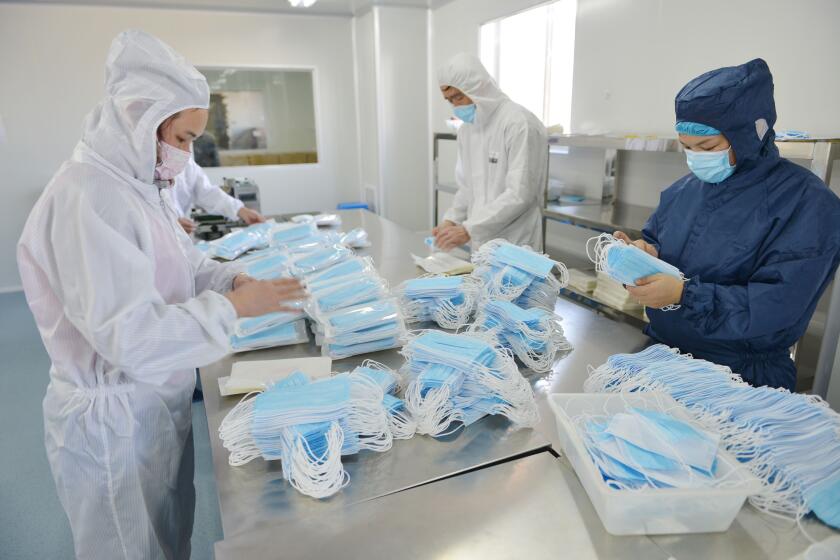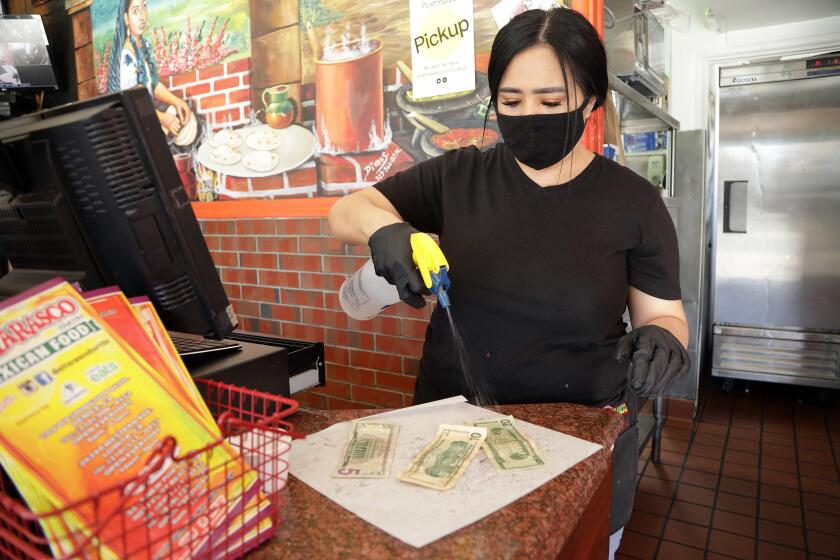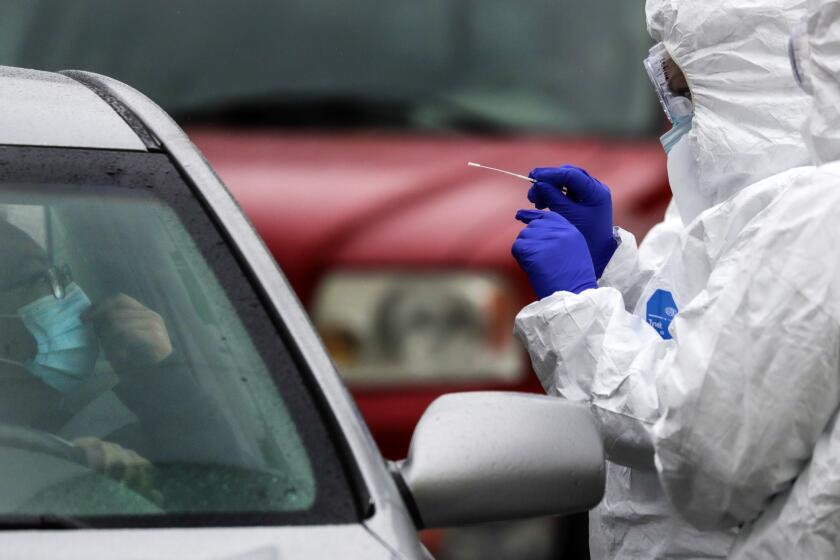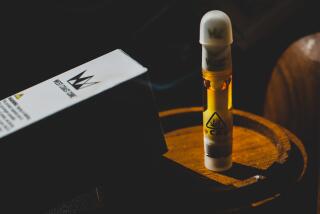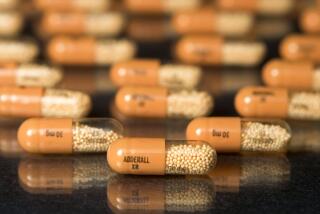Fake cures, scams, phony medications and price gouging: Predators pounce during coronavirus
- Share via
Three weeks ago, Lorina’s cellphone rang. Seeing it was a local call, the 61-year-old Riverside resident picked up.
A woman’s voice said she was working with Medicare, the national health insurance program, to distribute tests for COVID-19, the disease caused by the coronavirus. All she needed, the woman said, was Lorina’s name, address and Social Security and Medicare information.
“And stupid me, I gave it to her,” Lorina, who asked that her last name not be used to protect her privacy, said in an interview.
So goes one of the many frauds local and federal authorities say have emerged amid the COVID-19 pandemic, feeding off the fear and confusion bred by the virus and its lack of a cure or vaccine.
They range in perniciousness, from purveyors of unorthodox medical treatments who pivoted to hawking remedies for COVID-19, to sophisticated Medicare scammers, identity thieves and fraudsters who are soliciting investment in coronavirus treatments that don’t exist or aren’t recognized by government scientists.
“There is no shortage of people trying to cash in on this crisis, unfortunately,” Nick Hanna, the U.S. attorney in Los Angeles, said in an interview.
Hanna has assigned a prosecutor in his office to coordinate COVID fraud cases, reviewing tips from a hotline to potential scams within the sprawling Central California district and coordinating with the FBI and the array of other federal agencies investigating these types of cases. A second prosecutor is overseeing investigations into price gouging and hoarding of medical supplies and other products in high demand during the crisis.
Hanna said his office is prioritizing cases that would have the largest impact and deterrent effect, focusing on those that affect public health and safety. He declined to specify the number of investigations underway in the district.
“We’ve got a bunch of stuff in the works,” he said, including probes into fake test kits, hoarding and price gouging — “the full gamut.”
In one widespread scheme, said Timothy DeFrancesca, a special agent who leads the Los Angeles office of the Department of Health and Human Services’ Inspector General, fraudsters call Medicare beneficiaries at home, knock on their doors or approach them in the parking lots of grocery stores and pharmacies, then offer them home-test kits for COVID-19 or packages of hand sanitizer, masks and other protective equipment.
What they’re after, DeFrancesca said, is personal information such as Medicare numbers, which they can use to bill the federal government for procedures that aren’t performed and costly equipment that isn’t needed. They aren’t constrained by ripping off only Medicare, he said; armed with this information, “they could use it for any sort of financial fraud scheme.”
Any unsolicited phone call or visit from someone claiming to work for or with Medicare should be “an immediate alarm bell,” DeFrancesca said.
Chinese companies producing faulty testing kits and masks are marring Beijing’s attempts to assert leadership in the fight against the coronavirus.
Lorina, the 61-year-old who was talked into parting with her Medicare information, said she didn’t suspect anything was amiss. The woman on the phone “was pleasant,” she recalled. “She wasn’t in a hurry. But after I gave her my information, I was going to ask her a couple questions and she just hung up.”
Two weeks later, she was thumbing through the newsletter distributed by her senior-living apartment complex when, between the recipes and the word searches, she spotted a warning from a group called the Senior Medicare Patrol. The scam it described, she thought, sounded an awful lot like her promised COVID-19 test kit.
She reported the exchange to a hotline listed in the newsletter, and worried. She’s received no kit; nor has she gotten any of the expensive and unneeded medical equipment that fraudsters commonly charge to the federal government, she said.
“It worries me that people would do such a thing, but I guess they’re finding suckers like me,” she said. “I trust people — I’m too trusting, that’s the thing.”
As of Monday, the Federal Trade Commission, the agency tasked with protecting American consumers, has fielded about 16,800 complaints of coronavirus-related fraud, with a total reported loss of $12.78 million. The median loss for a complainant is $570.
Monica Vaca, the FTC’s associate director for consumer response and operations, pointed to two reasons why the pandemic has served as a springboard for fraud.
“First, it’s in the news,” Vaca said in an interview. “Scammers follow the headlines. And second, it’s triggered a highly emotional reaction. They feed off of that.”
California leads the nation with about 2,000 reports to the FTC of fraud, identity theft and other scams related to the coronavirus outbreak, 800 more than Florida, the state with the second-most complaints.
The FTC has sent letters to 25 companies and individuals, warning they’ve run afoul of consumer-protection laws in selling purported remedies for COVID-19, which include Chinese herbal solutions sold by a pharmacy in Kansas City; essential oils marketed by a Buena Park yogi who calls himself “Dr. Fresh”; and, more than any other substance, colloidal silver. Despite federal health officials’ insistence that colloidal silver cures nothing and can even harm your health, a number of businesses have hawked it as an antidote for COVID-19.
John Baxter, whose Orlando-based sleep technology company received a warning letter from the FTC, said he had trouble finding a silver supplier because many had sold out. He bought about $1,000 worth of silver and advertised a“Colloidal Silver CoronaVirus Convenience Package,” which he intended to sell as a loss leader, he said in an interview.
After getting pushback from the FTC, the FDA, Amazon and Facebook — which refused to run his ads, he said — “I was like, ‘Look, I’ll just pull it down.’”
“It’s good for the public to do their research,” Baxter said, “but I’ve had good success with the product. I haven’t been sick in seven years.”
The FTC is also warning of robocall and imposter scams, which con artists have injected with references to the coronavirus “to make things a little more scary,” Vaca, of the FTC, said.
Los Angeles Times’ visual coverage of the coronavirus crisis
In some of these scams, fraudsters offer to help businesses and individuals apply for government assistance payments, Vaca said, either to obtain their personal information or extract a bogus fee for “help” filing for the relief.
Confused and fearful as the country is, this scam is finding victims in every age group, she said. “You might think, ‘I’ve warned grandma; we’re good.’ This fraud, these scams, it’s like bird shot. It’s targeting everyone.”
Hanna, the top federal prosecutor in Los Angeles, said he expected the scope and breadth of such scams to grow as the government distributes payments to millions of people affected by the crisis, offering a fresh pool of money for scammers to exploit.
“These are not stupid people,” he said. “People work hard for their money, and these people work hard to steal your money.”
To date, Hanna’s office has charged two people with peddling phony cures for COVID-19.
Keith Lawrence Middlebrook, a small-time actor and bodybuilder, advertised to his 2.4 million Instagram followers both a pill that inoculated people from the virus and a cure for the disease it causes. His Instagram videos were viewed hundreds of thousands of times.
Middlebrook was charged with wire fraud, arrested at what he believed would be a rendezvous with an investor from whom he’d solicited a $300,000 investment, according to an FBI agent’s affidavit filed in court. The “investor” was an undercover agent.
Middlebrook, whose attorney didn’t respond to a request for comment, was released after his mother put up his bond. Among the conditions of his release: He cannot “promote, market, advertise and/or solicit investments” for any “purported cure or preventative treatment for COVID-19,” his bond sheet says.
Public health officials warn that the current “Wild West” of unregulated tests for COVID-19 is creating confusion that could ultimately slow the path to recovery.
Frank Richard Ludlow, a resident of the United Kingdom, was charged last month in Los Angeles with introducing misbranded drugs in interstate commerce with an intent to defraud or mislead. He was arrested by British authorities in southern England; it wasn’t clear from court records if he’d retained a lawyer.
Ludlow, who has for years peddled a “miracle cure” called the “Trinity Remedy,” repackaged the product as a treatment for COVID-19 and shipped dozens of the purported antidotes to Los Angeles and Utah, Virginia Keys, a special agent with the FDA’s Office of Criminal Investigations, wrote in an affidavit.
The Trinity Remedy, according to a Utah woman interviewed by investigators, was a mixture of vitamin C, potassium salts, enzyme mix and hydrogen peroxide. The woman, who suffered from “severe” health problems, started taking this cocktail in 2017.
“A consumer was supposed to add 18 ounces of water, say a prayer, drink half of the solution, take a probiotic along with bee pollen, and then ingest the remainder of the solution,” Keys wrote.
More to Read
Sign up for Essential California
The most important California stories and recommendations in your inbox every morning.
You may occasionally receive promotional content from the Los Angeles Times.

